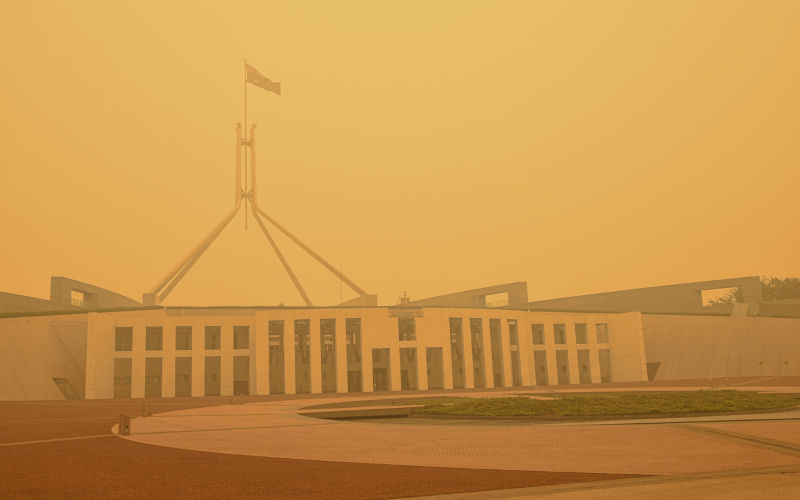Group think: Paralysis and the missing ONI climate security report
September 15, 2023
On assuming office, one of Prime Minister Albaneses first actions was to task the Office of National Intelligence (ONI) to review the security threats posed by climate change. The report was finalised in late 2022 but not made public. Accordingly, a release the ONI report campaign has dominated climate-security discourse over much of 2023. Foreign Minister Penny Wong recently confirmed the report will not be released, but that its finding are informing policy making.
Of course, the report and Government transparency IS important, however, tracking the ONI report debate (who instigated the narrative, who supports it and who uncritically follows) reveals dangerous group think. It is also possible that Australians have been subjected to a sophisticated information operation aimed at controlling and limiting climate security debate and ultimately, maintaining the status quo.
How did the ONI report announcement help maintain the status quo?
Given the defining feature of the election was the rise of climate independents, what if Albaneses announcement of a review was a tactic to appease and distract those concerned with climate action while the Government quickly consolidated AUKUS agreements; expanded fossil fuel exploration, such as in the Beetaloo Basin or Burrup Hub, and continued activities like controversial land-clearing?
A separate report for climate issues also allowed the Defence Strategic Review and subsequent AUKUS budgets allocations to proceed without factoring in how climate and ecological crisis change the logic of status quo security strategy altogether.
Who drove the subsequent we need the ONI security report narrative?
To kick the discourse off, in April 2023, Guardian defence reporter Daniel Hurst platformed retired Admiral Chris Barries call for the ONI report to be released. This was quickly echoed by The Ages foreign affairs reporter Stephen Dziedzic and The Greens who cited comments from the Breakthrough National Centre for Climate Restoration. In August, crossbenchers spoke on this issue; The Greens reiterated how important transparency was, while the Guardian ran another provocative headline Too hot to handle. In The New Daily, Michael Pascoe used the same phrase. Community peace and climate activists launched campaigns to press their local representatives for the ONI report to be released. Australian Climate Security Leaders Climate Group (ASLCG) representatives raised the issue in Pearls and Irritations, (in April and June), along with others like Sacha Shaw.
On 13 September, after a briefing by the ASLCG, Zali Steggall issued a media release reiterating the necessity of the ONI report and China-Hawk Matthew Knott added further heat to the issue, calling its non-disclosure a fatal mistake. Knotts article provided opportunity for Admiral (rtd) Barrie to criticise the Governments strategy of non-engagement and for the ASLCG to propose their solutions.
In short, instigated by defence insiders and journalists, driven by retired military chiefs (ASLCG) and their long time collaborator the Breakthrough group, fostered and stoked by the mainstream media, this debate has become the prime focus of climate-security discourse in Australia. The TEALS, crossbenches and earnest lobbying citizens have merely reinforced the same messages.
What is wrong with focus upon the we need the ONI report narrative?
The focus on the need for more information before acting is a commonly known tactic to delay action one which has dogged the climate policy debate for decades.
It is a stance mismatched to the context of 2023. It is three years since the Paris Agreement came into effect and the year in which the IPCC issued its final warning and climate breakdown began. Dr Andrew Forrest put it best when he said, actions must now rule and that there is now an immediate threat.
Pundits have argued the ONI report is essential for strategic planning and that the report may be so hard-hitting that it will provide a mandate for rapid whole of societal response. A climate activist whispered to me this how we can get traction; strategically, its our best hope. Yet there is a long history of hard-hitting climate reports and dramatic headlines. It is surreal to imagine that the ONI report could predict anything worse that what scientific reports already tell us: that we are accelerating towards a Hot House Earth scenario: a planet uninhabitable for most forms of planetary life.
Prior climate security assessments, like the 2003 Pentagon report or Australias 2017 Senate Inquiry, havent led to bold action. Neither has fervent research in areas like existential risk; collapsology; global catastrophic risk(GCR) and polycrisis dimensions.
Opportunity cost
The problem with reliance upon one ONI report, completed almost a year ago, is that geopolitics and security is a fluid game. Things are always in flux. Like any complex fast-moving crisis, what decision makers require is ongoing, updated assessments. Also, considering merely climate and security is not enough to understand the full threat environment.
Instead of a commissioning another report, limited time and money should have been spent upgrading intelligence capabilities so that they can analyse an entangled security environment (where planetary, human, and state security dimensions are understood as inherently interconnected) on an ongoing basis - not as a once off.
Time is short to plan and develop a concept for emergency or transformational response, but also, in the short term, to prepare for the likely coming of an El Nino affected summer.
At parliament House, on 31 July 2023, with Amanda McKenzie, CEO of the Climate Council in the background, TEALs called for a war-like effort to address this crisis. Ironically, these same people have turned their backs on PLAN E, which offers a concept for a war-like scale response.
TEALS and activists have supported the status quo, not transformation
Those who voted for climate independents, especially women, hoped for a new era in climate policy discourse, where new voices could be included.
What has happened is that leading climate and peace voices have instead aligned with existing structures of power and status quo climate security positions.
It is time they and all of us - began supporting new, transformative approaches.

